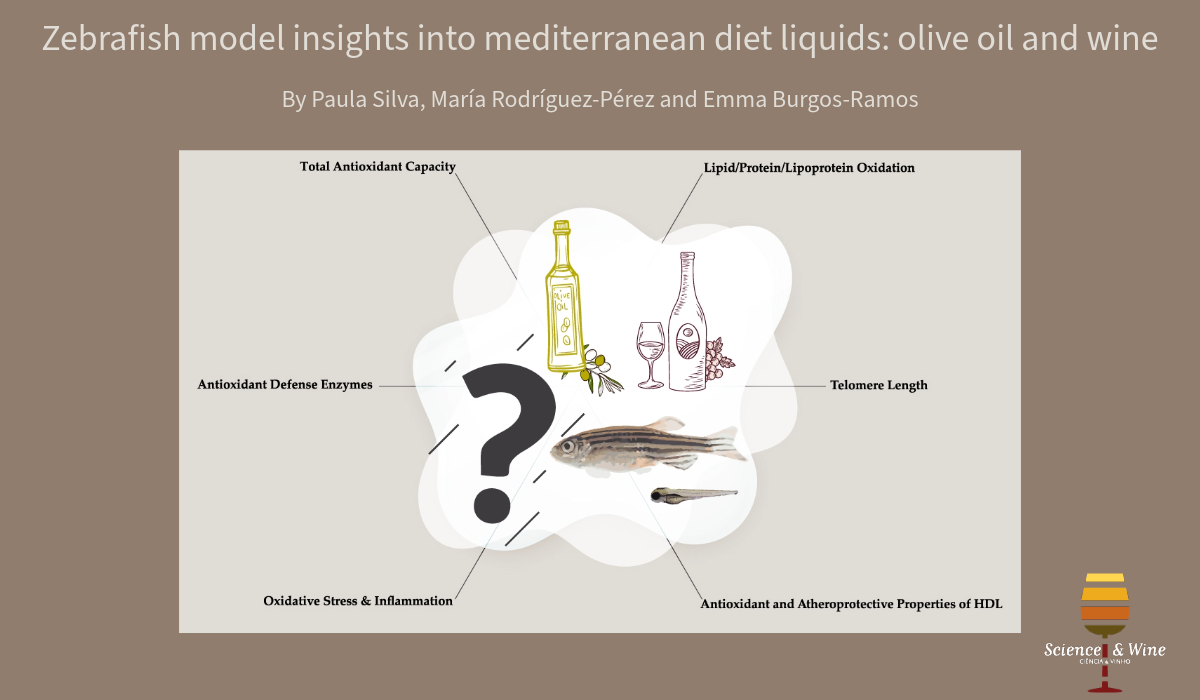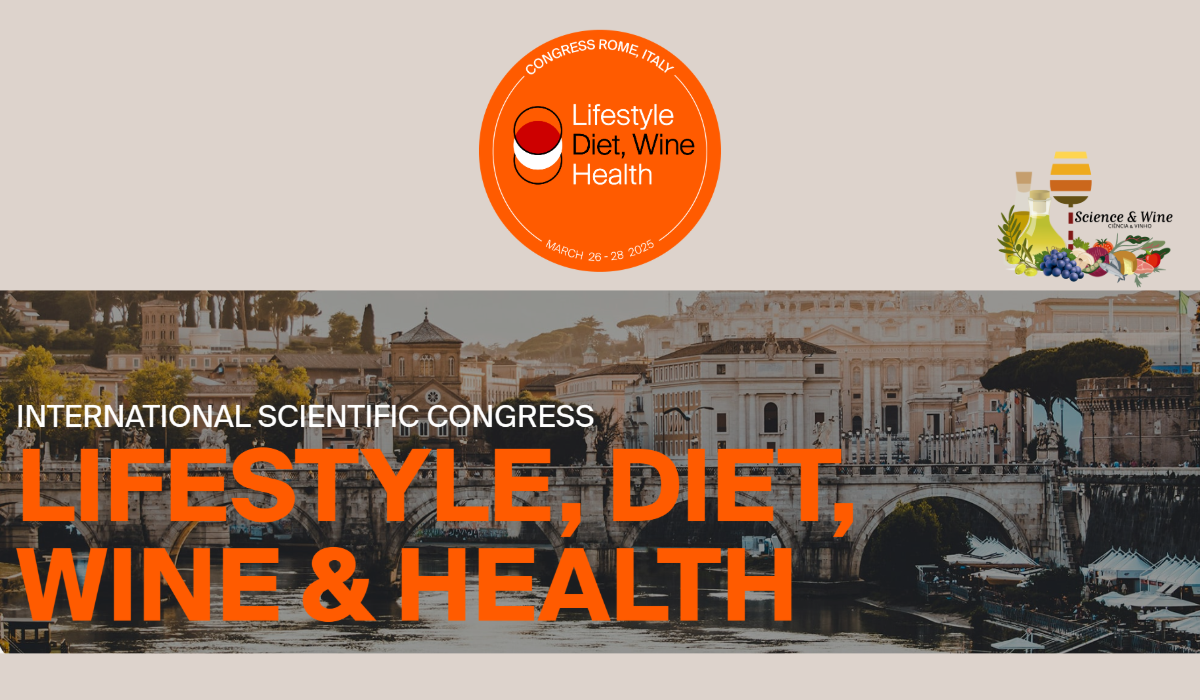The second edition of the “Lifestyle, Diet, Wine & Health” congress, partnered with Science and Wine, will be held in Rome, Italy from March 26-28, 2025. This international event brings together leading scientists to present the latest research on healthy lifestyles, combining information on active living, balanced Mediterranean-style diets, and moderate wine consumption.

Neuroprotective Effects of Olive Oil: A Comprehensive Review of Antioxidant Properties
Neurodegenerative diseases driven by oxidative stress pose significant global health challenges. “Neuroprotective Effects of Olive Oil: A Comprehensive Review of Antioxidant Properties,” published in Antioxidants (MDPI), explores olive oil’s potential in combating these diseases through its antioxidants—oleuropein, hydroxytyrosol, and oleocanthal. These compounds reduce oxidative stress and inflammation while improving mitochondrial function. Incorporating olive oil into dietary patterns, particularly in the Mediterranean diet, is associated with a lower risk of neurodegenerative diseases. However, long-term clinical trials are required to translate these benefits into practical dietary recommendations. This review highlights the promising role of olive oil in preventive neurology, by reducing the risk of neurodegenerative conditions through its potent antioxidant properties.

Accounting for circular economy principles in Life Cycle Assessments of extra-virgin olive oil supply chains
The paper by Grazia Cinardi et al. explores the application of circular economy (CE) principles within the extra-virgin olive oil (EVOO) sector using life cycle assessments (LCA). It aims to identify sustainable practices that reduce environmental impacts associated with olive oil production.

A Narrative Review of Metabolomic Insights into Olive Oil’s Nutritional Value
This review explores the critical role of advanced metabolomic methodologies in interpreting the complex relationship between the bioactive compounds in olive oil and their health benefits. Olive oil, the cornerstone of the Mediterranean Diet, is renowned for its numerous health benefits including anti-inflammatory, antioxidant, and cardioprotective properties. This review begins with an overview of the importance of olive oil for nutrition and health, followed by a detailed discussion of the key metabolites that contribute to its therapeutic potential. It further explores the evolution of analytical techniques in metabolomics, from traditional methods to cutting-edge technologies, such as mass spectrometry and nuclear magnetic resonance spectroscopy, which have enhanced our understanding of the complex composition of olive oil. This review highlights how these advanced analytical findings correlate with the known health properties of olive oil and presents case studies in which these methodologies have led to new insights. Finally, we address the challenges in standardizing these techniques and discuss future research directions, underscoring the significance of metabolomics in nutritional science and public health. This comprehensive analysis aims to provide a deeper understanding of the health benefits of olive oil, informed by the latest advancements in analytical methodologies

The Mediterranean diet: a historical perspective
The Mediterranean diet originated in the Mediterranean basin and initially consisted of staples, such as olives, grapes, and wheat, which have a long history in the region. Over time, diet evolved due to various historical influences, including the introduction of wild and uncultivated products, game meat, pork, and vegetables during the barbarian invasions of the Roman Empire between 400 and 800 AD. The Arab influence in the ninth century brought a significant shift towards carbohydrate-rich foods, particularly dried pasta, as well as a variety of spices and seasonings. The discovery of the Americas introduced new ingredients, such as turkey, potatoes, corn, tomatoes, strawberries, pineapples, coconuts, and peanuts, along with chocolate, coffee, and sugar, which enriched the Mediterranean diet and made it as varied and rich as it is today. These historical developments have contributed to the rich diversity of the Mediterranean diet, making it a dynamic and continually evolving cuisine that reflects the fusion of cultures, ingredients, and culinary techniques across centuries and continents.

Underrated aspects of a true Mediterranean diet: understanding traditional features for worldwide application of a “Planeterranean” diet
This study explored the multifaceted nature of the Mediterranean diet, beyond its commonly recognized health benefits. It argues that traditional assessment methods focusing on specific food items and dietary scores fail to capture the diet’s cultural, environmental, and lifestyle dimensions. The paper emphasizes the holistic essence of diet, deeply embedded in the history and traditions of the Mediterranean people, which includes a diverse array of foods, social dining practices, and sustainable local agricultural methods. This paper suggests that future research should integrate these underrated aspects, considering the diet’s broader cultural and lifestyle context, to truly understand its impact on health and well-being. This comprehensive approach would allow for the application of a ” planeterranean ” diet globally, promoting not only nutritional health but also environmental and social well-being.

Importance of phenolic compounds in virgin olive oil in cancer treatment
Cancer remains a major health challenge worldwide, with natural compounds offering promising avenues for treatment and prevention. Specifically, olive oil-derived compounds such as oleuropein (OLE) and hydroxytyrosol (HT) are being investigated for their health benefits. These natural products, with a focus on compounds from the Mediterranean Diet, show potential as complementary therapies alongside conventional cancer treatments due to their accessibility and reduced toxicity.

Association of plant-based dietary patterns with the risk of type 2 diabetes mellitus using cross-sectional results from RaNCD cohort
This study examines the relationship between plant-based diets and the risk of Type 2 Diabetes Mellitus (T2DM). Using data from the Ravansar Non-Communicable Disease cohort, it included 7,100 Kurdish participants, after excluding those with certain health conditions and dietary extremes. The research assessed the association between a Plant-Based Diet Index (PDI) and T2DM incidence, using a food frequency questionnaire to evaluate participants’ diets.

High Extra Virgin Olive Oil Consumption Is Linked to a Lower Prevalence of NAFLD with a Prominent Effect in Obese Subjects
Unlock the secret to a healthier life with Extra Virgin Olive Oil (EVOO)! 🌿 Recent research reveals its powerful impact on liver health, specifically in combating Non-Alcoholic Fatty Liver Disease (NAFLD). 🫒 Dive into the study findings: High EVOO consumption is linked to a remarkable 26% reduction in NAFLD risk for our friends dealing with obesity! 💪✨ Whether you’re aiming for wellness or battling the bulge, let EVOO be your ally. 🍽️ Embrace the goodness and savor the journey to a healthier you!

Zebrafish Model Insights into Mediterranean Diet Liquids: Olive Oil and Wine
We are thrilled to announce this week’s blog post on Science & Wine, dive into the fascinating world of antioxidants and the Mediterranean diet, as we proudly present our latest review published in the renowned MDPI Antioxidants Journal. In this groundbreaking review, we embarked on a journey through the intricate universe of age-related diseases, particularly cardiovascular conditions. We delved deeply into the powerful effects of two Mediterranean diet superheroes: Olive Oil and Wine! Our exploration ranged from intriguing observational studies to cutting-edge preclinical experiments, paving the way for potential translational breakthroughs in zebrafish experimentation. Why Zebrafish? Ever wondered how tiny fish could hold the key to understanding the health issues of olive oil and wine. The astonishing genetic proximity of zebrafish to humans offers a unique gateway to unravel the mysteries of these Mediterranean marvels. This review sheds light on the immense potential of zebrafish as an experimental model, urging scientists worldwide to fully harness its power. Let us explore the uncharted territories together, pushing the boundaries of knowledge and advancing our understanding of age-related disease prevention within the Mediterranean dietary framework.

